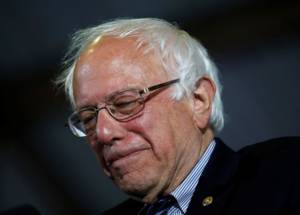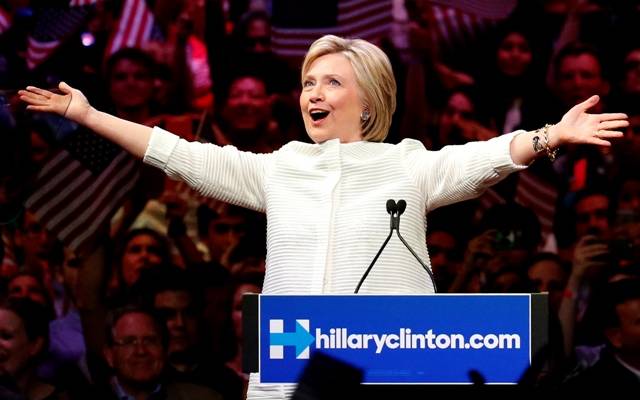For the first time in US history, in what is a remarkable milestone for the American people, a female candidate has been chosen to represent a major political party in the race to become the next president of the United States.
Claiming her place in history, Hillary Clinton declared victory Tuesday night in her bruising battle for the Democratic presidential nomination, becoming the first woman to lead a major American political party and casting herself as the beneficiary of generations who fought for equality.
“This campaign is about making sure there are no ceilings, no limits on any of us,” Clinton said during an emotional rally in Brooklyn, eight years to the day after she ended her first failed White House run. As she took the stage to raucous cheers, she paused to relish the moment, flinging her arms wide and beaming broadly.
Clinton had already secured the delegates needed for the nomination.
Clinton faces a two-front challenge in the coming days. She must appeal to the enthusiastic supporters of her rival Bernie Sanders — who vowed to stay in the race despite having no realistic path to the nomination — and sharpen her contrasts with presumptive Republican nominee Donald Trump.
She sought to make progress on both, using her own loss in 2008 to connect with Sanders’ backers.
“It never feels good to put our heart into a cause or a candidate you believe in and come up short,” she said. “I know that feeling well. But as we look ahead to the battle that awaits, let’s remember all that unites us.”

Sen. Bernie Sanders. (AP/John Locher)
Sanders, speaking at a rally in Santa Monica, California, said he’d spoken to Clinton late Tuesday. He notably stripped his speech of all criticism of her, but still pledged to compete in next week’s final primary in the District of Columbia and take his fight for “social, economic, racial and environmental justice” to the Democratic convention.
“Our fight is to transform this country and to understand that we are in this together, to understand that all of what we believe is what the majority of the American people believe and to understand that the struggle continues,” he declared.
Clinton had an edge over Sanders in California, but votes were still being counted early Wednesday. Sanders has hoped a win in California would give him ammunition to convince super-delegates to abandon Clinton before the Democratic convention in July.
Clinton is eager to avoid a convention fight and to set her sights fully on Trump. She was biting and sarcastic as she took on the billionaire businessman, accusing him of wanting to win “by stoking fear and rubbing salt in wounds — and reminding us daily just how great he is.”
Clinton’s new wins came a day after she secured the 2,383 delegates she needed to become the presumptive Democratic nominee, according to an Associated Press tally. Her total includes pledged delegates won in primaries and caucuses, as well as super-delegates — the party officials and officeholders who can back a candidate of their choosing.
President Barack Obama called both Clinton and Sanders late Tuesday. The White House said Obama congratulated Clinton for “securing the delegates necessary to clinch the Democratic nomination for president” and praised her “historic campaign,” though he did not formally endorse her.
The White House said Obama and Sanders will meet at the White House on Thursday, at the Vermont senator’s request
Sanders picked up wins in North Dakota and Montana, where a small number of delegates were up for grabs.
His achievements have been remarkable for a candidate who was unknown to most Americans before the campaign. He has drawn massive crowds to rallies around the country and built a fundraising juggernaut based largely on small donations online. The Vermont senator has been particularly popular with young voters, an important piece of the Democratic coalition.
Still, Clinton’s victory has been broadly decisive. She leads Sanders by more than 3 million cast votes. She has 2,469 delegates to Sanders’ 1,637. That count includes both pledged delegates and super-delegates.
By: AP
Please note: United with Israel does not endorse any US presidential candidate and this article should not be misinterpreted as such.
